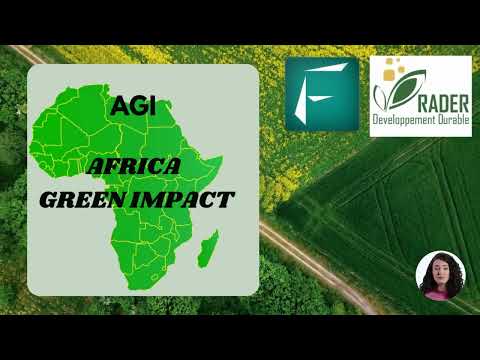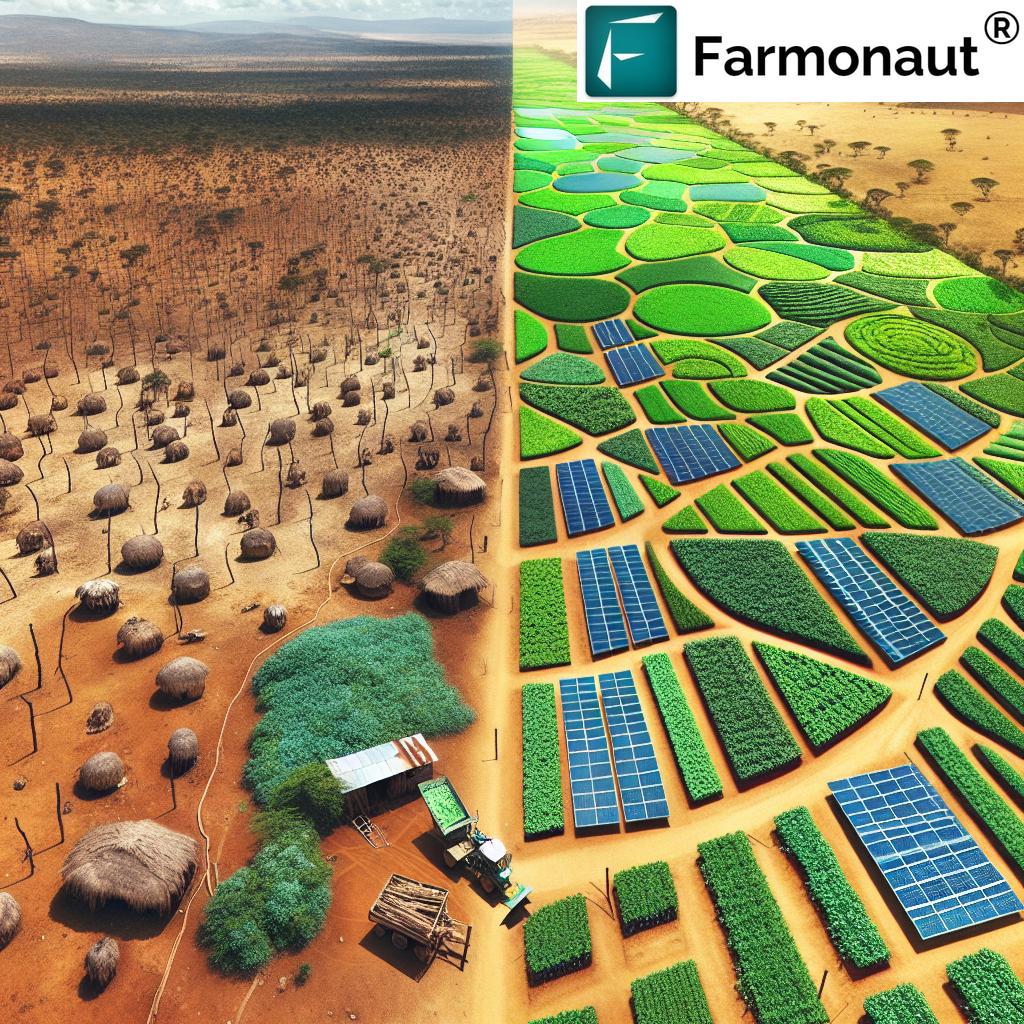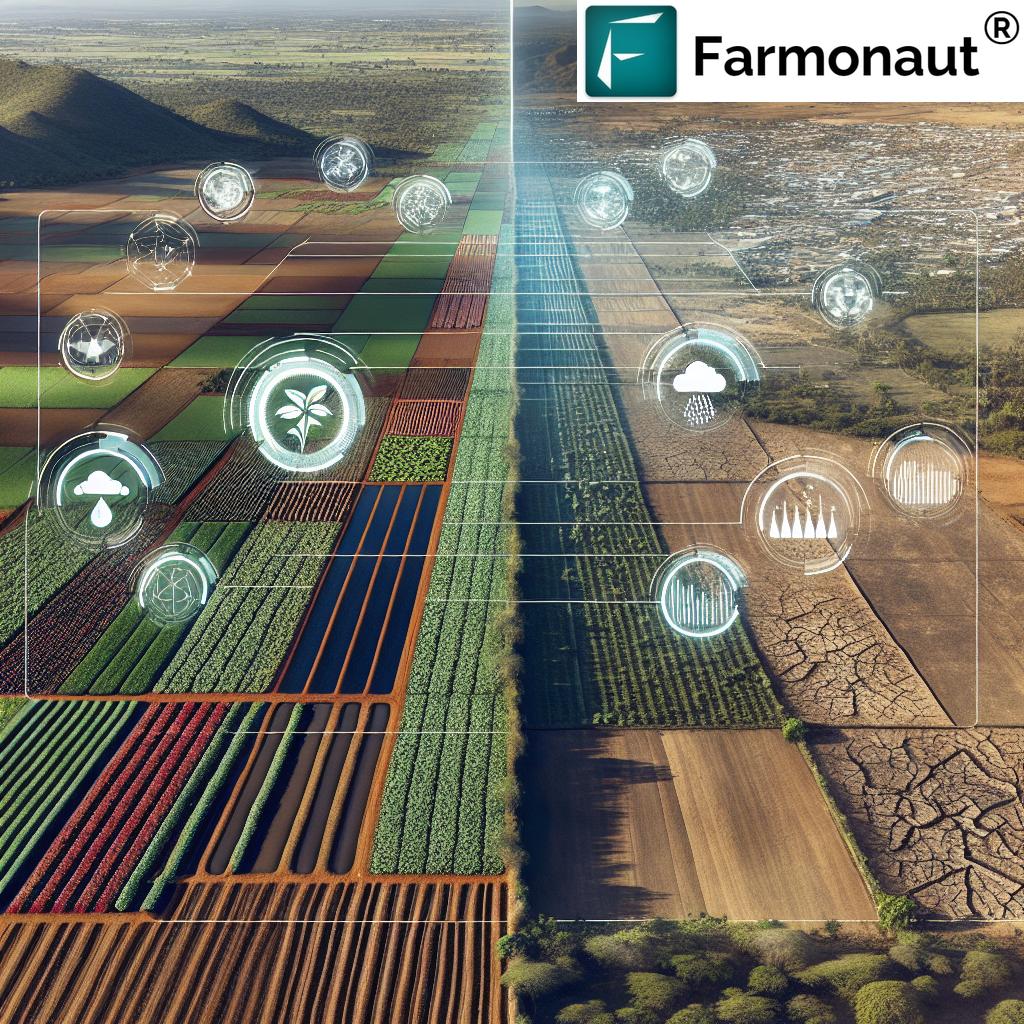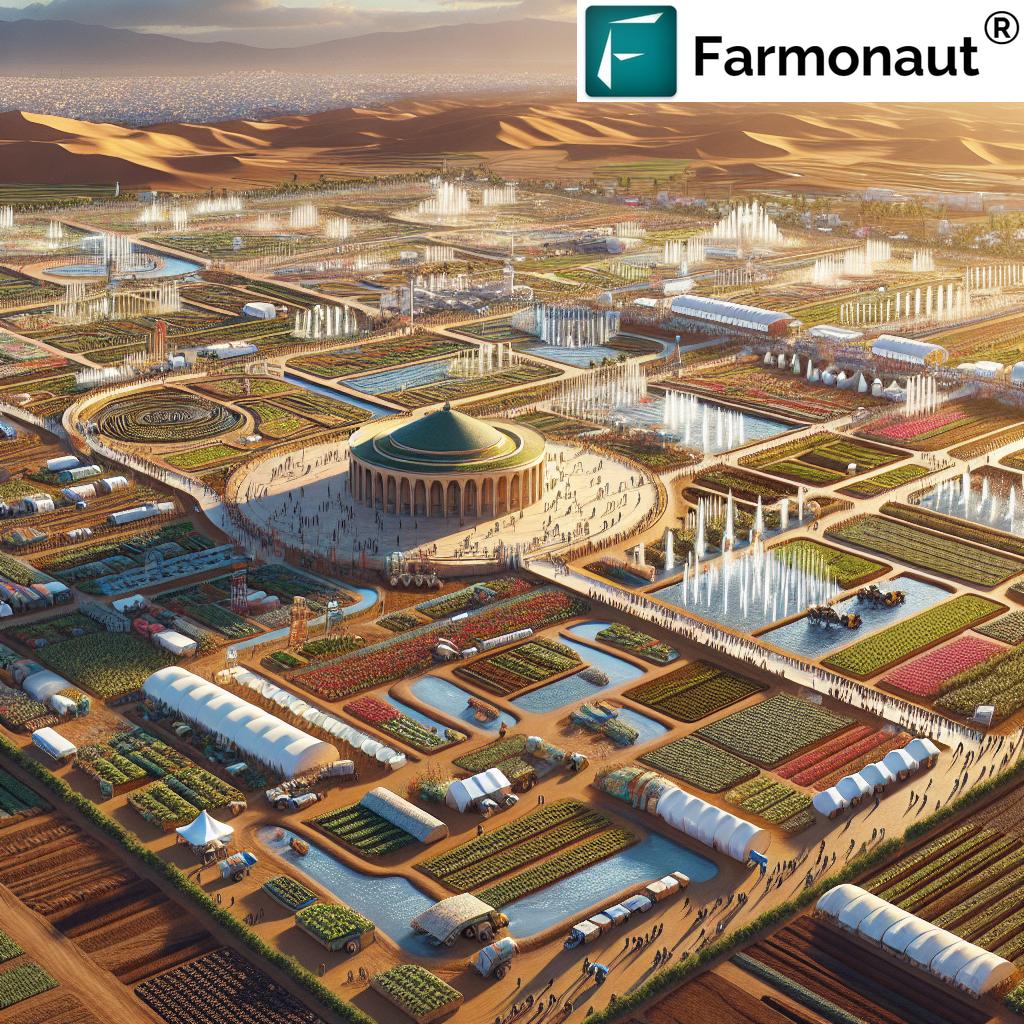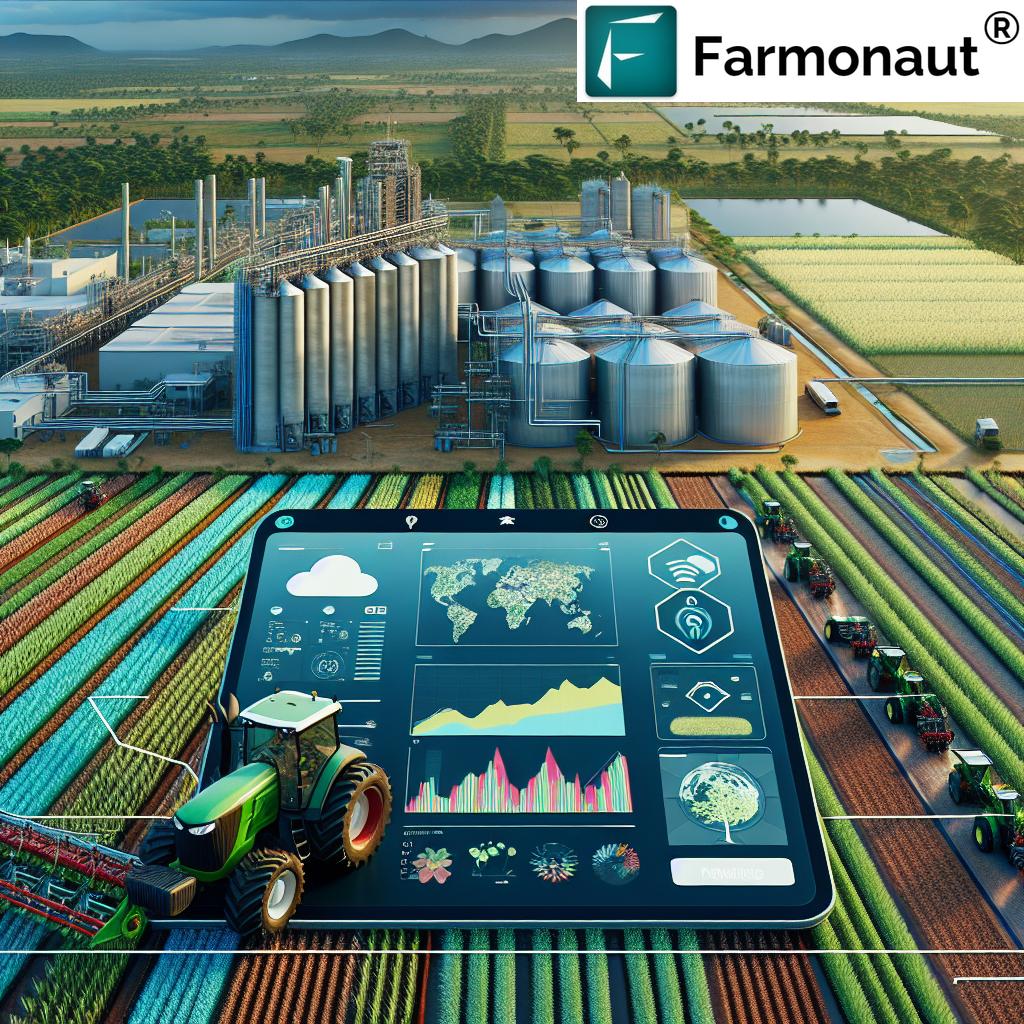Revolutionizing African Agriculture: Farmonaut’s Agroecological Solutions for Sustainable Food Security in Mali

In the face of escalating food insecurity across Africa, we find ourselves at a critical juncture where innovative solutions are not just desirable, but essential. As we delve into the complexities of African agricultural development, we’ll explore how Farmonaut’s cutting-edge technologies are paving the way for a sustainable and food-secure future, with a special focus on Mali.
“Mali’s adoption of agroecological practices has increased crop yields by up to 30% in some regions.”
The State of Food Security in Africa: A Call for Radical Transformation
The United Nations’ 2024 report paints a stark picture of food insecurity in Africa. With over 20% of the population—approximately 298.4 million individuals—facing undernourishment, the continent is grappling with a crisis that far exceeds global averages. This alarming situation is further exacerbated by the dual challenges of climate change and conflict, which continue to undermine agricultural productivity and food distribution networks.
However, as we dig deeper, we uncover that the roots of this crisis extend far beyond recent events. They are, in fact, deeply entrenched in historical agricultural practices established during the colonial era. These outdated approaches have perpetuated a cycle of food insecurity that calls for nothing short of a radical transformation.
The Limitations of Commercial Agriculture
- Overemphasis on cash crops
- Neglect of local food systems
- Unsustainable use of resources
- Increased vulnerability to market fluctuations
The prevailing focus on commercial agricultural production, rooted in colonial-era theories, has led to a narrow view of food security. This approach prioritizes large-scale production of a few cash crops, often at the expense of diverse, locally-adapted food systems. As a result, many African countries find themselves trapped in a cycle where increased production doesn’t necessarily translate to improved food security.
Take, for instance, the case of Mali. The nation’s heavy emphasis on cotton exports, intended to boost economic growth, has inadvertently led to deteriorating soil health and increased child malnutrition rates. This scenario starkly illustrates how a singular focus on commercial agriculture can undermine the very food security it aims to achieve.
Farmonaut: Pioneering Agroecological Solutions for Africa
In light of these challenges, Farmonaut emerges as a beacon of hope, offering innovative solutions that align with agroecological principles. By leveraging advanced technologies such as satellite imagery, artificial intelligence, and blockchain, Farmonaut is revolutionizing the approach to sustainable agriculture in Africa.
Explore Farmonaut’s solutions:
Satellite-Based Crop Health Monitoring
Farmonaut’s satellite-based crop health monitoring system provides real-time insights into vegetation health, soil moisture levels, and other critical metrics. This technology enables farmers in Mali and across Africa to make informed decisions about irrigation, fertilizer usage, and pest management, optimizing crop yields while reducing resource wastage.
AI-Driven Advisory System
The Jeevn AI advisory system delivers personalized farm management strategies, weather forecasts, and expert crop management advice. By analyzing satellite data and other inputs, this system generates customized recommendations that help farmers improve productivity and efficiency, even in the face of climate change challenges.
Blockchain-Based Traceability
Farmonaut’s blockchain technology ensures transparency and security throughout the agricultural supply chain. This is particularly crucial for Mali’s cotton industry, allowing for better tracking of products from farm to consumer, enhancing trust, and reducing fraud in supply chains.
Agroecology: A Sustainable Path Forward
Agroecology, an approach that harmonizes agricultural practices with natural processes, offers a viable solution to the entrenched problems of food insecurity in Africa. This method encompasses a variety of practices that yield greater resilience, enhance soil fertility, and are cost-effective—all crucial factors for smallholder farmers in countries like Mali.
“Sustainable farming methods in Africa can reduce water usage by 50% compared to conventional agriculture.”
Key Agroecological Practices
- Polycropping: Growing multiple crops in the same space
- Agroforestry: Integrating trees with crops or livestock
- Natural pest control: Using biological methods to manage pests
- Soil conservation: Implementing techniques to preserve soil health
These practices not only improve soil health and biodiversity but also contribute to climate change mitigation and adaptation. In Mali, for example, the adoption of agroforestry techniques has shown promising results in combating desertification and improving food security.
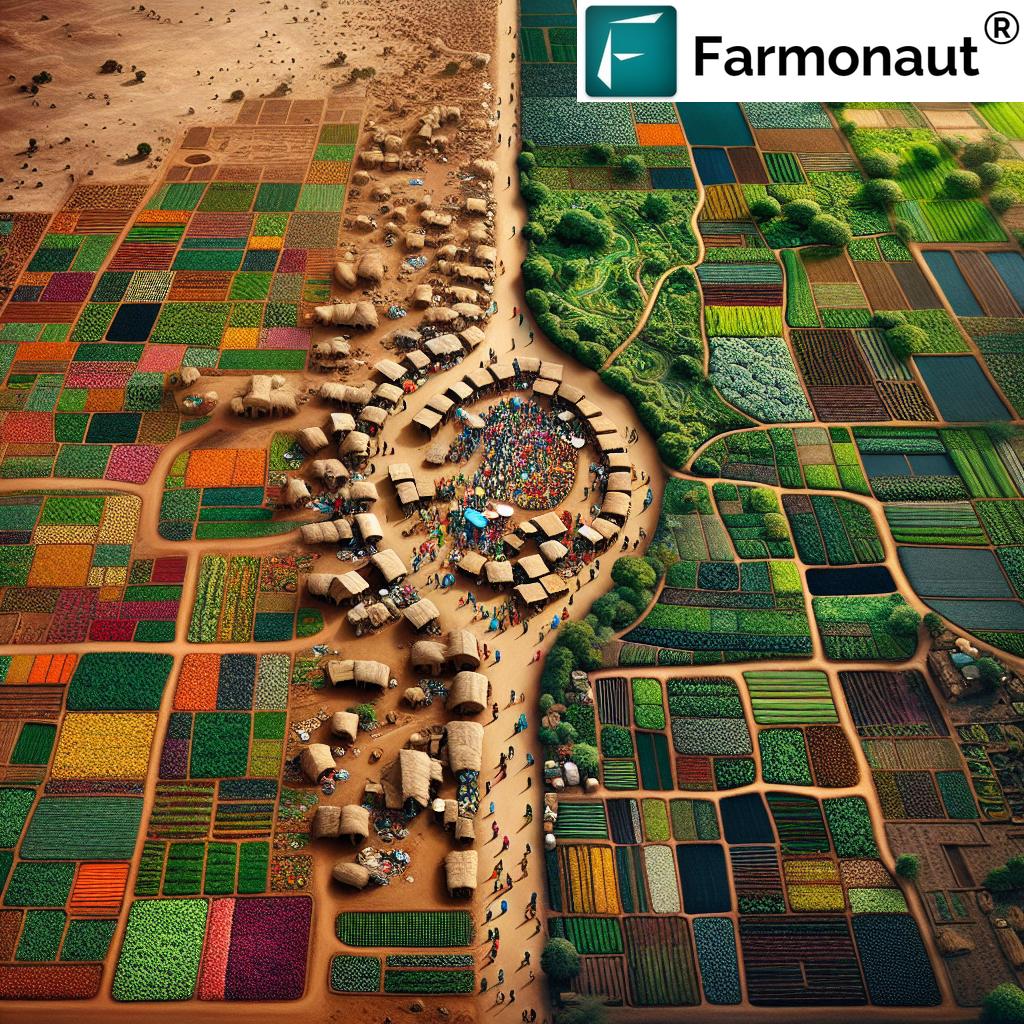
Farmonaut’s Role in Promoting Agroecology in Mali
Farmonaut’s technologies play a crucial role in supporting the transition to agroecological practices in Mali and beyond. By providing farmers with precise, real-time data on their crops and environmental conditions, Farmonaut empowers them to make informed decisions that align with agroecological principles.
Crop Diversification Strategies
Using Farmonaut’s satellite imagery and AI advisory system, farmers in Mali can identify optimal areas for crop diversification. This helps in implementing polycropping systems that enhance soil health, reduce pest pressure, and improve overall farm resilience.
Soil Health Improvement
Farmonaut’s soil moisture monitoring capabilities enable farmers to implement precise irrigation strategies, preventing overwatering and soil degradation. Combined with agroecological practices like cover cropping and minimal tillage, this technology supports long-term soil health improvement.
Access Farmonaut’s API for custom solutions:
Resource Optimization
By providing detailed insights into crop health and environmental conditions, Farmonaut helps farmers optimize their use of inputs such as water and fertilizers. This not only reduces costs but also minimizes the environmental impact of farming activities.
Comparing Traditional vs. Agroecological Farming Practices in Mali
| Farming Aspect | Traditional Methods | Agroecological Solutions | Potential Improvement |
|---|---|---|---|
| Crop Diversity | Monoculture (e.g., cotton) | Polycropping, intercropping | 30% increase in overall yield |
| Soil Management | Heavy tillage, chemical fertilizers | Minimal tillage, organic matter incorporation | 50% improvement in soil fertility |
| Water Conservation | Flood irrigation | Precision irrigation guided by Farmonaut data | 40% reduction in water usage |
| Pest Control | Chemical pesticides | Integrated Pest Management (IPM) | 60% decrease in pesticide use |
| Climate Resilience | Limited adaptation strategies | Agroforestry, drought-resistant varieties | 25% increase in climate resilience |
This comparison clearly illustrates the potential benefits of transitioning to agroecological practices in Mali. By leveraging Farmonaut’s technologies, farmers can more effectively implement these sustainable methods, leading to improved yields, reduced environmental impact, and enhanced food security.
Overcoming Challenges in Implementing Agroecological Solutions
While the benefits of agroecological approaches are clear, their widespread adoption in Mali and other African countries faces several challenges. Farmonaut’s technologies play a crucial role in addressing these obstacles:
- Knowledge Gap: Farmonaut’s AI advisory system provides farmers with tailored guidance on implementing agroecological practices.
- Resource Constraints: By optimizing resource use, Farmonaut helps farmers maximize the impact of limited inputs.
- Market Access: Blockchain-based traceability enhances the value of agroecologically produced crops in international markets.
- Climate Uncertainty: Real-time satellite monitoring and weather forecasts help farmers adapt to changing climate conditions.
Explore Farmonaut’s mobile solutions:
The Future of Sustainable Agriculture in Africa
As we look to the future of agriculture in Africa, the integration of agroecological practices supported by advanced technologies like those offered by Farmonaut presents a promising path forward. This approach not only addresses the immediate challenges of food insecurity but also contributes to long-term sustainability and resilience in the face of climate change.
Key Areas of Focus
- Scaling up agroecological practices across diverse African landscapes
- Enhancing farmer education and knowledge sharing through digital platforms
- Developing policies that support sustainable agricultural practices
- Strengthening local food systems and reducing dependence on imports
By embracing these strategies and leveraging technologies like Farmonaut, African countries can move towards a more sustainable and food-secure future. The transformation of agriculture in Mali serves as a powerful example of what’s possible when traditional knowledge is combined with innovative technology.
Conclusion: A Call to Action for Sustainable Food Systems
The journey towards sustainable food security in Africa, particularly in countries like Mali, is complex and multifaceted. However, with the integration of agroecological practices and innovative technologies like those offered by Farmonaut, we see a clear path forward. This approach not only addresses the immediate needs of farmers and communities but also contributes to the long-term health of our planet.
As we conclude, we call upon policymakers, farmers, researchers, and technology providers to come together in support of this agricultural transformation. By embracing agroecology and leveraging advanced technologies, we can create resilient, sustainable food systems that ensure food security for generations to come.
The future of African agriculture lies in harmonizing traditional wisdom with cutting-edge innovation. With companies like Farmonaut leading the way, we are one step closer to achieving food security and sustainability across the continent.
FAQ Section
Q: What is agroecology and how does it differ from traditional farming?
A: Agroecology is an approach to farming that applies ecological principles to agricultural systems. Unlike traditional farming, which often relies on monocultures and chemical inputs, agroecology focuses on working with natural processes, enhancing biodiversity, and creating sustainable ecosystems.
Q: How does Farmonaut contribute to sustainable agriculture in Africa?
A: Farmonaut provides advanced technological solutions such as satellite-based crop monitoring, AI-driven advisory systems, and blockchain-based traceability. These tools help farmers implement sustainable practices, optimize resource use, and make informed decisions, all of which contribute to more sustainable and productive agriculture.
Q: Can small-scale farmers in Mali benefit from Farmonaut’s technologies?
A: Yes, Farmonaut’s solutions are designed to be accessible and beneficial for farmers of all scales. Small-scale farmers in Mali can use Farmonaut’s mobile apps to access crucial information about their crops, receive personalized advice, and implement more efficient farming practices.
Q: How does agroecology address climate change challenges in African agriculture?
A: Agroecology promotes practices that enhance soil health, increase biodiversity, and improve water retention. These practices not only help farms become more resilient to climate change impacts but also contribute to carbon sequestration, thus playing a role in mitigating climate change.
Q: What role does crop diversification play in food security?
A: Crop diversification is crucial for food security as it helps to spread risk, improve soil health, and provide a more varied and nutritious food supply. Farmonaut’s technologies support farmers in implementing effective crop diversification strategies tailored to their specific conditions.








